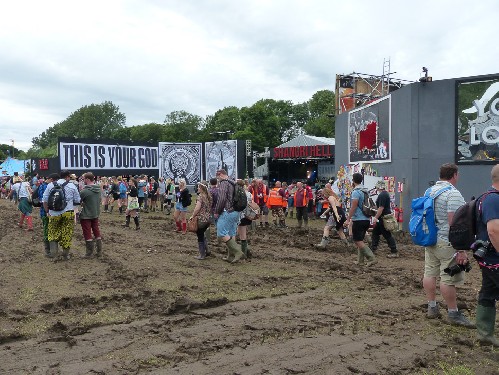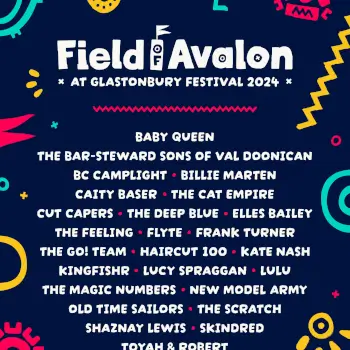
Glastonbury Festival 2016
Wednesday 22nd to Sunday 26th June 2016Worthy Farm, Pilton, Shepton Mallet, Somerset, BA4 4AZ, England MAP
£228 - SOLD OUT
Last night the de-brief report on Glastonbury Festival 2016 was submitted to Mendip District Council and matters covered by the Premises Licence issued by the Council scrutinised, and can be accessed in full (here).
The extensive reports that accompany the de-brief are quite numerous and lengthy so we have summarised them for you below:
The current licence authorises one event per year from 2014 to 2024, for a maximum period on, each occasion, of six consecutive days. The event may be attended by 203,000 people, 135,000 of whom will be public ticket holders, inclusive of weekend tickets.
The weather conditions proved testing for much of the event after 78mm of rain fell within a 2 hour period causing the site to become saturated on the Friday before the Festival.
The main topic the de-brief report deals with is the disruption caused to all road users during the evening of Tuesday 21 stJune and during Wednesday 22nd June as a result of poor weather conditions and there being no suitable alternative facilities to accommodate campervans and caravans when access to the planned sites became problematic.
The report states this created unacceptable road traffic conditions on both main routes and the smaller local routes significantly disrupting peoples travel plans and business. The slow moving traffic also resulted in stranded drivers/passengers littering and fouling verges and private property to the further annoyance of local residents.
The report says it realises that any large public event there is the recognition that at times there may some short periods of localised traffic disruption but with local businesses and residents alerted to the hot spots delays can be managed, local alternative routes used and inconvenience kept to a minimum. Traffic has been managed well by GFEL over years as a result of changes to the traffic management plan, including staggering arrivals and increasing the use of public transport. However it was clear that the management of traffic immediately prior to the Festival in 2016 fell short of acceptable for 24 hours from the early evening of Tuesday 21st June when tailbacks blocked major and minor local routes.
This impacted on residents, school children, and businesses within the Pilton, Shepton Mallet and the wider area, as well as those just passing through the area. In total the council received 19 complaints about the delays. The problem was started by the build up of campervans who despite being emailed that there was a delay in the opening of the camping fields from noon until 6pm many were already on the road and didn't get the message.
Once the site had opened ground conditions had not significantly improved during the day and due to the weight of the vehicles many had to be towed by tractors compounding the damage. This was a very slow process. The Festival planned to work through the night towing vans on site however 3-4 hours of rain during the night continuing to slow process with more live in vehicles arriving and now mixing with car arrivals further building the hold-ups. By 5am it was evident that there was 5 miles of queuing traffic on all major routes . A contingency parking plan for camper/caravans was actioned to enable them to be removed from the road network, parking them at the Bath & West Showground. Finally traffic started flowing although it remained very heavy all day not easing significantly until later in the evening.
The report concludes that despite the efforts of Festival organisers it is clear that more robust contingency planning is required as well as greater importance placed on the ‘off - site’ issues as a consequence of the event.
In addition the weather created some challenges on site but the various teams worked hard throughout the event to rectify problems promptly with none being highlighted as an issue in the report.
There was also good news with reported crime and arrest numbers the lowest of any previous Glastonbury Festival. No significant disorder issues were identified this year and reported crime decreased further, demonstrating continuous improvement over several years, figures being 372 in 2014, 236 in 2015 and 205 in 2016. Most recorded crimes related to theft from tents (mostly small transportable items such as mobile phones, cash, cameras, wallets, bank cards).
Whilst the Council continued to receive noise complaints throughout the Festival on site monitoring revealed there was only one slight breach of the volume on Friday night at the end of Muse's headlining show on the main stage. There were no further breaches of music noise limits on subsequent days. The Council recommend that the Festival ensures it doesn't happen again.
The 5,748 toilets and 700 metres of urinals also came under scrutiny with the 'Don't Pee On The Land' message commended. This year all long drop tanks had been lined to prevent leakage, monitoring devices were installed on long drop tanks so that fill levels could be monitored remotely, and a review of the drainage and water courses was undertaken. Water Aid employed low pressure options for cleaning toilets to limit aerosol dispersal, and the report notes the new Water Aid cleaning crews for the long drop facilities resulted in a noticeable improvement in cleaning standards and practices.
External campsites do not need to be licensed in the same way as the festival so the council and other agencies are unable to limit their number as their existence is a result of entrepreneurism. These sites are organised independently and the regulatory agencies required to ensure compliance of a variety of legal requirements is not offset against any fee and no enforcement costs are currently recoverable. Equally noise nuisance, traffic nuisance and poor public safety as a result of poorly managed external campsite operations all impact on the Festival's relationship with the local community and potentially their relationship with any ticket holder that uses those facilities. There were no complaints about the 18 external campsites.
The 2016 event was a success in terms of the management of health and safety at work. Plus The team had nothing negative to report in regard to Security at the event this year.
Despite the very muddy site only one food trader was prevented from trading until the premises were thoroughly cleaned to remove severe mud contamination.
One breach of the Private Water Supply Regulations 2009 occurred on Monday 20th June 2016 in a crew area which had been flooded over the weekend.
Recommendations for next year include continuing to prevent public camping areas being used prior to the opening of the festival and the even distribution of tents across the site. Review the provision and placing of water/toilet points are required in the public camping areas. A review of the number of people per campervan (probably higher due to the weather). Improved access to the campervan/caravan fields and strengthen contingency plans for bad weather that may occur prior to and/or during the event. The practice of using pallets to make walkways in public areas must be prohibited.
Bella’s Bridge must be refurbished as the wooden structure has deteriorated.
They also recommend a review of the provision of late night entertainment to better meet demand and improve the customer experience.
The report also surmises that given the complexity of the event there comes a point, when the public are on their way and the show must go on. Organisers should be congratulated for keeping the event going and promptly dealing with any reports of deteriorating and unsafe conditions as they arose. This was achieved due to the enormous effort from hard working staff and volunteers and an audience prepared to accept difficult and unpleasant conditions.
They propose the Festival should look to investigate the requirements for future events for the welfare of those hard working staff and volunteers given the conditions and sustained pressure they were under this year.
Radiohead are the first act to be confirmed for Glastonbury Festival 2017 which will take place at a farm in Pilton, Somerset over five full days on the last weekend in June, that's from Wednesday 21st to Sunday 25th June 2017. It looks likely that Foo Fighters will fill the final headlining slot.
Expect something like 3,000 performances at over 100 venues including music, cabaret, theatre, circus, a fantastic Kidz area, poetry, green crafts and information, site art, decor, and loads, loads more.
Tickets for Glastonbury Festival have sold out. There will be a re-sale, which is likely to be in April or May 2017. In order to buy a ticket Festival goers over the age of 12 must be registered, with online registration only taking a few minutes, this needs to be completed before trying to buy a ticket. Children aged 12 and under do not require tickets and do not need to register.
Registration does not mean you have bought a ticket, but you can't buy a ticket without a registration number.
To register click here.
As usual eFestivals will bring you the very best-sourced rumours, allowing festival-goers to see who is playing long before the bands are formally announced - keep your eyes on the Glastonbury 2017 rumours, updated as we receive information.
Help us to help you - if you hear of a band that's playing, please let us know.
Latest Updates
 Glastonbury Festival 2024
Glastonbury Festival 2024festival details
 Glastonbury 2024 - Field Of Avalon Reveals Lineup
Glastonbury 2024 - Field Of Avalon Reveals LineupBaby Queen, BC Camplight, The Feeling to take to the Avalon Stage
 Glastonbury Festival 2024
Glastonbury Festival 2024line-ups & rumours
 Glastonbury 2024 - First Acoustic Stage Acts Announced!
Glastonbury 2024 - First Acoustic Stage Acts Announced!The Bootleg Beatles, Scouting For Girls, and Ocean Colour Scene set to perform
 First Glastonbury Lineup And Headliners Announced for 2024
First Glastonbury Lineup And Headliners Announced for 2024The much-awaited first lineup announcement is here!





